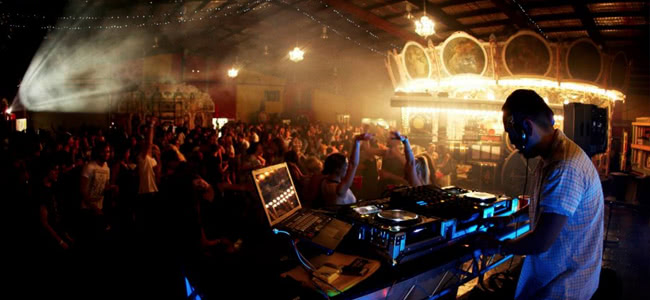Sydney’s live music venues have been suffering all year under the oppression of tough lockout laws that were rushed through Parliament in January, and while the city’s music scene has put up heavy resistance the strict reforms have led to a major revival for Sydney’s historic rave culture.
Despite NSW Government officials cracking down hard on venues that are struggling to comply with the implementation of 1:30am lockouts, 3am last drinks, and the statewide closure of bottle shops from 10pm, ‘illegal’ warehouse parties have experienced a major “renaissance” in Sydney’s inner-west suburbs.
The growing success of dance parties and raves hosted in disused studios and secret locations, from Marrickville to Alexandria, is enough to draw patrons away from established entertainment venues, as one club owner tells The Sydney Morning Herald.
“It’s definitely a renaissance,” says Murat Kilic, owner of the Spice Cellar nightclub, of the “uprising” in warehouse parties, some of which were attracting up to 1,000 patrons a night. Mr Kilic tells the paper he’d also witnessed the “completely illegal” activities happening at three warehouse events, such as indoor smoking, open drug use, potential fire safety hazards, and more.
[include_post id=”395994″]
“We’re talking BYO parties where people are bringing their own booze, there are no cameras, there is grossly inadequate security, there are hazards everywhere. It’s exactly what the authorities don’t want,” he said.
“The police don’t even know what’s happening, otherwise it wouldn’t be happening. It just shows their lack of understanding of what lockouts are actually doing on the ground.”
Love Music?
Get your daily dose of metal, rock, indie, pop, and everything else in between.
NSW Police however, believes that there has actually been a decrease in the rate of “detected” warehouse parties in the suburb of Marrickville in the last 12 months, while local council (who interestingly had pushed for the legalisation of ‘illegal’ raves last year) said that complaints had dropped in the last 12 months.
Music promoter Sasha Skalrud disagrees, telling SMH that there had been a “huge increase” in this week alone. Having already predicted that there would be rise in illegal raves in response to the lockout laws, the promoter now estimates there are up to 15 parties in “definitely unsanctioned areas” taking place each weekend. Some reaching up to 800 or 900 attendees, who co-ordinate the dance events through word of mouth and social media in order to elude authorities.
Meanwhile Oxford Art Factory’s Mark Gerber says that the resurgence of illegal music raves, the kind that were popular in the late 1970s and ’80s, was to be embraced rather than combated. “You need rebellion to create change,” he says. “It’s never going to end and it’s a good thing. Local councils should support it and not fight it.”
[include_post id=”415008″]
The reports of increased illegal raves arrives as the NSW Office of Liquor, Gaming and Racing (OLGR) issues a warning to Sydney venues across the board to play by the book, or face the hefty financial consequences for non-compliance.
The OLGR has recently slugged 66 venues with alcohol bans or restrictions after investigating 95 suspect alcohol promotions and activities, increasing its policing by 57% in the last 12 months compared to the same time last year. It warns that venues conducting irresponsible promotions could face up to $5,500 in fines for failing to meet State regulations.
“The NSW Government will not apologise for throwing the book at inappropriate or reckless behaviour by licensed venues, said Minister for Hospitality, Gaming and Racing Troy Grant in a statement. “All licensed venues have a responsibility to ensure they comply with the responsible service of alcohol and they owe it to the community to encourage appropriate individual behaviour.
OLGR Executive Director Paul Newson also urged venues and licensees to promote and serve alcohol responsibly or face regulatory action. “Under NSW liquor laws, licensees and their staff must not only demonstrate responsible practices regarding the sale, supply and service of alcohol but also its promotion,” Mr Newson said.
“Irresponsible alcohol promotions can increase the risk of intoxication and associated community impacts such as violence, anti-social behaviour and neighbourhood disturbance.
“OLGR is proactively targeting irresponsible alcohol promotions which can increase the risk of alcohol-related harm including those advertised on venue websites and social media sites such as Facebook which have a wide exposure and target young adults,” Mr Newson said.
(Photo & Source: Redd Cups)


































